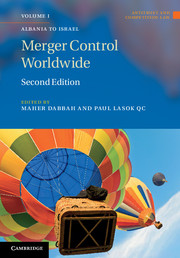Book contents
- Frontmatter
- Contents
- Preface
- List of Contributors
- Table of cases
- Table of Legislation and Official Guidance
- Introduction
- Albania
- Argentina
- Armenia (Republic of Armenia)
- Australia
- Austria
- Barbados
- Belgium
- Bosnia and Herzegovina
- Brazil
- Bulgaria (Republic of Bulgaria)
- Canada
- Chile
- China*
- Costa Rica
- Croatia
- Cyprus (Republic of Cyprus)
- Czech Republic
- Denmark
- Estonia
- European Economic Area
- European Union
- Finland
- France
- Germany (Federal Republic of Germany)
- Greece
- Hong Kong
- Hungary
- Iceland
- India
- Indonesia (Republic of Indonesia)
- Ireland
- Israel
- Italy
- Japan
- Kenya
- Korea
- Latvia
- Lithuania
- Macedonia (Republic of Macedonia)
- Malta
- Mexico
- Netherlands (The Netherlands)
- New Zealand
- Norway
- Pakistan
- Peru
- Philippines (Republic of the Philippines)
- Poland
- Portugal
- Romania
- Russia
- Serbia
- Singapore
- Slovakia (Slovak Republic)
- Slovenia
- South Africa
- Spain
- Sri Lanka
- Sweden
- Switzerland
- Taiwan
- Thailand
- Tunisia (Republic of Tunisia)
- Turkey
- Ukraine
- United Kingdom
- United States of America
- Uzbekistan
- Venezuela
- Zambia
- Index
Bulgaria (Republic of Bulgaria)
Published online by Cambridge University Press: 05 November 2014
- Frontmatter
- Contents
- Preface
- List of Contributors
- Table of cases
- Table of Legislation and Official Guidance
- Introduction
- Albania
- Argentina
- Armenia (Republic of Armenia)
- Australia
- Austria
- Barbados
- Belgium
- Bosnia and Herzegovina
- Brazil
- Bulgaria (Republic of Bulgaria)
- Canada
- Chile
- China*
- Costa Rica
- Croatia
- Cyprus (Republic of Cyprus)
- Czech Republic
- Denmark
- Estonia
- European Economic Area
- European Union
- Finland
- France
- Germany (Federal Republic of Germany)
- Greece
- Hong Kong
- Hungary
- Iceland
- India
- Indonesia (Republic of Indonesia)
- Ireland
- Israel
- Italy
- Japan
- Kenya
- Korea
- Latvia
- Lithuania
- Macedonia (Republic of Macedonia)
- Malta
- Mexico
- Netherlands (The Netherlands)
- New Zealand
- Norway
- Pakistan
- Peru
- Philippines (Republic of the Philippines)
- Poland
- Portugal
- Romania
- Russia
- Serbia
- Singapore
- Slovakia (Slovak Republic)
- Slovenia
- South Africa
- Spain
- Sri Lanka
- Sweden
- Switzerland
- Taiwan
- Thailand
- Tunisia (Republic of Tunisia)
- Turkey
- Ukraine
- United Kingdom
- United States of America
- Uzbekistan
- Venezuela
- Zambia
- Index
Summary
The Law of Protection of Competition
At present mergers are regulated under the Law of Protection of Competition of 2008 (LPC).
The first Bulgarian law in this area was the Law on Protection of Competition adopted in 1991, a year of hectic legislative activity of the Bulgarian Parliament striving to ensure an adequate legal framework for the new market economy. Although far from perfect and revealing large gaps in regulation, the 1991 Law on Protection of Competition introduced in the Bulgarian legal environment some absolutely new concepts like monopoly, prohibited anti-competitive agreements, unfair competition, etc., thus laying the foundations of Bulgarian competition law, and established the regulator in the field: the Commission for Protection of Competition (CPC or ‘the Commission’).
Following the entry of the country into an association agreement with the European Union (EU) and the obligations undertaken by this agreement, including those concerning the regulation of competition, an entirely new Law on Protection of Competition was adopted by the Parliament in 1998. The new law introduced the principles of European Union competition law, still taking into account the speciics of the still developing Bulgarian market. This law introduced a number of new legal concepts, such as ‘dominant position’, ‘co-ordinated practices’, ‘concentration of business activities’, ‘relevant market’, etc. The powers of the CPC were increased and clarified; the fines applicable for infringements of the law were increased.
- Type
- Chapter
- Information
- Merger Control Worldwide , pp. 232 - 242Publisher: Cambridge University PressPrint publication year: 2012



